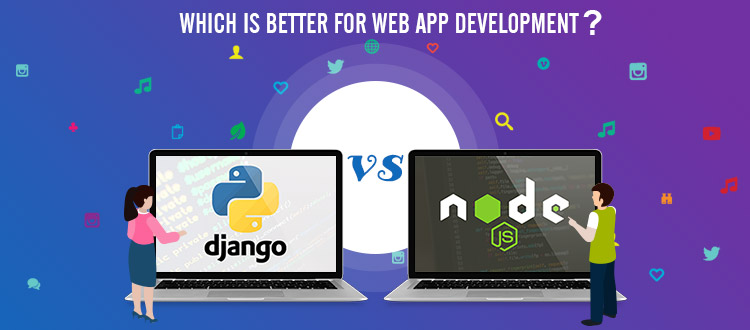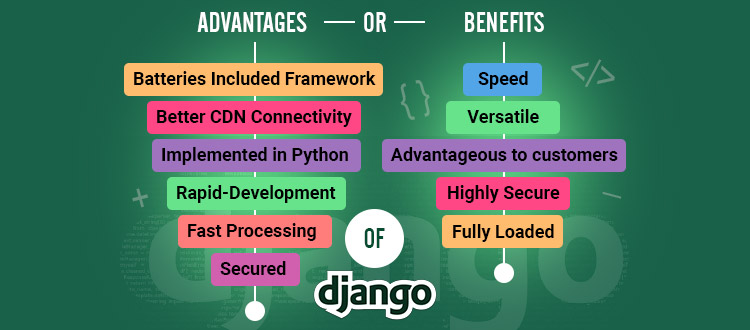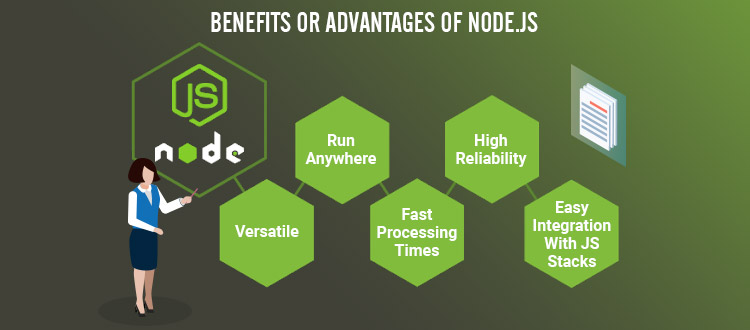In order to understand the difference between Django and Node.js, we have to understand their programming languages and data capabilities which form the core of both platforms.
While the planning face is carried out for a mobile or web development project, programming teams will have to make a decision regarding the choice of the framework they are going to use for the purpose of designing and governing the apps they build. This particular choice primarily depends upon the overall business requirements of the project along with the skillset and specific expertise of your team. However, other factors should also be taken into consideration, for example, whether the Django and Node.js development companies want something that is unique or something that needs a lot of customization.
For meeting the needs of web and mobile developers, we have mainly two popular open-source framework options – Django and Node.js. Each of the frameworks is unique in its own sense and the use of either of the framework depends on the type and complexity of the project. This article will give you an overview of the history and important features of both frameworks. Further, we will review the key comparison points that are responsible for helping developers in deciding which framework to choose for their mobile devices and web application development projects.
History and Background of Django and Node.js
Django was released as an open-source framework in 2005 for feature-rich web app development. Most of the features of Django are centric on accelerating the designing and deployment process by enforcing simple syntax and readable code. There is a feature called object-relational mapping which is considered one of the most important features of Django. In that feature, database builds get simplified through data manipulation. Now the developers need not write complex SQL queries, rather, they can access the ORM layer for translating the corresponding Python code into a suitable query language. This can be really helpful in streamlining and updating the relevant operations.
In the year 2019, Node.js also started as an open-source project and established its reputation among the developers’ community by building networked web applications on Windows, Linux, and macOS platforms. This popularity slowly penetrated into mobile application development as well. Hence the mobile app designers were highly motivated by the framework with its ability to handle database integrations, its competence in routing from multiple nodes, and the accessible template engines that provide exclusive functionalities for new applications.
Also Read: Introduction to Python- How can Python Web Development Benefit Business?
Advantages or Benefits of Django
Django has a lot of advantages, especially in the field of data handling, support, and process acceleration. Let us look at them one by one:
Simplified Data Modeling
Django works on the Model Template View Framework which converts data into a specific model and makes it confirm to application logic. Finally, it sends that particular model to the templates which help in structuring the data. Django is enriched with a built-in templating language system that generates HTML, separates logic from views, enables code reuse, and filters content before it reaches the browser.
Access to Libraries
This Python-based framework gives access to developers of multiple numbers of established Python libraries. A form library is also provided by the framework that renders HTML format in a simplified manner. Hence, you get more front end design control as developers can ensure the linking between specific match with an application to match the visual appearance.
Security in Django
A range of security features can also be accessed by the developers in Django. For example, there are mechanisms in the framework to insert secret, user-specific tokens into post requests that help in defending against cross-site scripting and request forgery. The framework also provides other features that guard specifically against SQL injection attacks.
Web App Compression
Django provides SEO tools to reduce webpage loading time through cached pages. You can easily bundle multiple CSS and JavaScript files into one single file by using the Django Webpacker Compressor tool.
Disadvantages or Limitations of Django
There are three main limitations of Django namely catching, request handling, and component packaging. Let us try to explain them one by one:
Catching Risks in Django
It is due to the modularity of the framework, developers can rest assured that stack’s each element will function independently on its own. However, a careful configuration is required of the cache manager for guarding against catching an entire site.
Also Read: IoT Impacting the Future of Web Development
Multiple Request Handling
Despite having efficiency in building web and mobile applications, the framework’s ability to handle multiple requests is quite limited.
Deployment in Django can be quite confusing as there are numerous components combined together in the framework, say, for example, all models are included in a single file. Also, recognizing and pinpointing default errors inherited from templates can be quite hard.
Benefits or Advantages of Node.js
Node.js is famous for providing prewritten codes and class libraries for both simple and complex data structures. Let’s discuss some of the main benefits of Node.js that makes it appealing:
JavaScript Support
Through JavaScript, the developers are allowed to write both front end and back end application code in JS. This helps them in creating reusable code and modules that they can retrieve without any issue.
Multi-Tasking in Node.js
Multiple simultaneous operations can be handled by JavaScript as it excels with real-time systems. Node.js is an event-driven framework in which requests are put on an event loop, processed, and delegated accordingly. By this, the applications and services can handle multiple requests at one time which is a great advantage for distributed application systems.
Simple Database Design
Programmers are not required to declare a strict scheme while developing databases so that they can more easily convert database entries into objects of JavaScript to simplify data access.
Powerful Package Repositories
The NPM repository which is called as Node Package Manager Repository provided plenty of development packages that developers can browse for specific functions, features, and components required for their project. Also, developers can employ Node Package Manager Tools that help in publishing projects, streamlining package installation, managing versions, and controlling dependencies.
Async Process Support
Node.js has an async.hooks module that provides an API whose job is to register and track calls and asynchronous requests made across Node.js applications. Scalability is also provided by the framework by allowing developers to access modules clusters and run multiple instances on an app inside one device. Check here why consider Node.js for development.
Drawbacks of Node.js
Along with so many benefits, the framework also carries some drawbacks which are as follows:
Data Processing Limits
Despite being effective in handling asynchronous requests, the code in Node.js still follows single-threaded execution. This means that it is still quite hazardous to use for heavy, long-running CPU operations or machine learning programs. This is due to the fact that parallel code processing can probably block the servers.
Callback Overloads in Node.js
Though it can handle asynchronous requests, developers run the risk of overloading the number of calls the app attempts to handle at one single time. Due to this, the overall performance can get seriously hampered and ultimately it becomes difficult to clean up the code.
Shortcoming of JavaScript
There are some shortcomings in JavaScript libraries which are also then inherited in Node.js such as database operations or praising XML. These limitations are very frustrating for the developers as they may not find the right amount of relief in Node.js.
The Final Words – Django vs. Node.js
In the end, let us conclude by saying that both the frameworks – Django and Node.js have their strengths as well as drawbacks. Hence, it is very difficult to pass a judgment on which one to choose. However, whatever benefits and limitations we have discussed above will help you in analyzing which one to choose to make the final call on Node.js vs. Django.
Therefore, the best thing to do is frame your decision based on your requirements and the overall budget of your project. If your project is very huge, contains a lot of data and you want to hire Python developers then Django might be the appropriate choice. On the other hand, when the data is not that heavy and we want a simple way to create high-performing web applications then we go with Node.js which is the right choice for traditional JavaScript shops. At last, it is your decision and you must consider all the factors before making the final choice. You can contact us and we will help you in your project as we have a team of talented developers who are well versed in working on multiple frameworks including Node.js and Django.
Great Together!






![Everything About WordPress Development – [ A Handy Guide ]](https://theninehertz.com/wp-content/uploads/2020/08/How-Much-Does-WordPress-Development-Cost.jpg)






